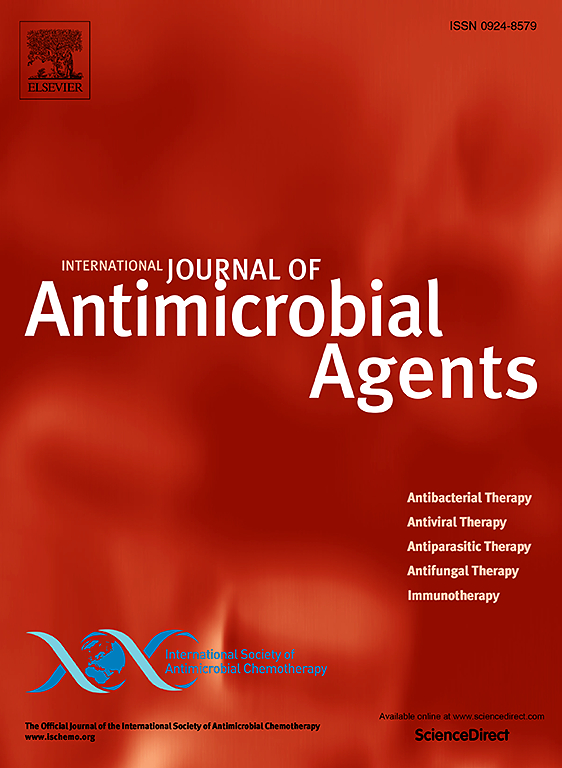The evolution of carbapenem-resistant Pseudomonas aeruginosa in the COVID-19 era: A global perspective and regional insights
IF 4.6
2区 医学
Q1 INFECTIOUS DISEASES
International Journal of Antimicrobial Agents
Pub Date : 2025-02-17
DOI:10.1016/j.ijantimicag.2025.107466
引用次数: 0
Abstract
Objective
Carbapenem-resistant Pseudomonas aeruginosa (CRPA) is a major contributor to healthcare-associated infections globally. The aim of this study was the impact of the COVID-19 pandemic on the genomic characteristics of P. aeruginosa, particularly clinical CRPA isolates.
Methods
Clinical data of each patient were collected from the clinical and medical record system. Whole-genome sequencing and bioinformatics analyses were performed to characterize the antibiotic resistance genes (ARGs) and evolutionary dynamics of these isolates. Furthermore, big data analysis was employed to elucidate the genomic characteristics of P. aeruginosa genomes across different periods on a global scale. Statistical analyses were applied to ensure the reliability of the findings.
Results
A total of 628 non-duplicate CRPA isolates were collected, with 256 isolates from before the COVID-19 pandemic and 372 during the pandemic. Only 26.59% of isolates carried carbapenemases, predominantly GES-14, and carbapenemase diversity decreased during the pandemic. However, the diversity of CRPA sequence types (STs) increased, with ST235 and ST244 emerging as the most prevalent clones. The Antibiotic resistance genes (ARGs) number carried by CRPA isolates significantly decreased during the pandemic (P < 0.05), with notable differences in 24 ARGs and 14 virulence factors (VFs) between prepandemic and pandemic periods (χ2 test, P < 0.05). O11 was the predominant serotype across all periods. Global analysis revealed a significant reduction in ARGs in strains from China and Australia (P < 0.01) during the pandemic. Analysis of the global epidemic clones ST244 and ST235 indicated that ARGs in ST244 P. aeruginosa increased significantly during the pandemic.
Conclusions
Our study highlights the critical need for ongoing surveillance of the evolutionary effects of the COVID-19 pandemic on clinical CRPA isolates, offering an essential theoretical basis for the development of effective and rational control strategies in clinical settings.

2019冠状病毒病时代耐碳青霉烯假单胞菌的演变:全球视角和区域见解
碳青霉烯耐药铜绿假单胞菌(CRPA)是全球卫生保健相关感染的主要贡献者。本研究对中国河南省某医院5年(2018-2022年)收集的628株非重复CRPA分离株进行了分子流行病学分析,其中256株来自COVID-19大流行前,372株来自大流行期间。只有26.59%的分离株携带碳青霉烯酶,主要是GES-14,并且碳青霉烯酶多样性在大流行期间下降。然而,CRPA序列类型(STs)的多样性增加,ST235和ST244成为最普遍的克隆。CRPA分离株携带的抗生素耐药基因(ARGs)数量在大流行期间显著减少(p < 0.05),其中24个ARGs和14个毒力因子(VFs)在大流行前和大流行期间差异有统计学意义(χ2检验,p < 0.05)。O11是所有时期的主要血清型。全球分析显示,大流行期间,中国和澳大利亚毒株的ARGs显著减少(p < 0.01),而美国、新加坡和西班牙的ARGs则有所增加。对全球流行克隆ST244和ST235的分析表明,在大流行期间,ST244株铜绿假单胞菌的ARGs显著增加,而ST235株的ARGs未见显著变化。本研究为制定抗CRPA感染的临床策略提供了重要的见解。
本文章由计算机程序翻译,如有差异,请以英文原文为准。
求助全文
约1分钟内获得全文
求助全文
来源期刊
CiteScore
21.60
自引率
0.90%
发文量
176
审稿时长
36 days
期刊介绍:
The International Journal of Antimicrobial Agents is a peer-reviewed publication offering comprehensive and current reference information on the physical, pharmacological, in vitro, and clinical properties of individual antimicrobial agents, covering antiviral, antiparasitic, antibacterial, and antifungal agents. The journal not only communicates new trends and developments through authoritative review articles but also addresses the critical issue of antimicrobial resistance, both in hospital and community settings. Published content includes solicited reviews by leading experts and high-quality original research papers in the specified fields.

 求助内容:
求助内容: 应助结果提醒方式:
应助结果提醒方式:


